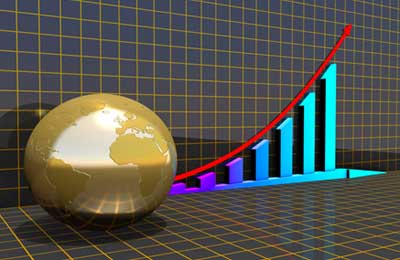
Market capitalisation of top 500 firms hits $25trn
Doha, November 5, 2012
The total market capitalisation of the top 500 global companies increased 17 per cent from September 2011 to September 2012 to $25 trillion, equivalent to about 35 per cent of global GDP, a report said.
The Financial Times (FT) recently released its list of the top 500 global companies by market capitalisation as at end-September 2012.
The strong performance of the leading global stocks has been supported by rising global market capitalisation during this period, according to QNB Group.
The MSCI All Country World Index for Large Capitalised Companies rose 18 per cent in the year to end-September as concerns about sovereign debt in advanced economies, particularly the Eurozone, have eased and central banks have maintained highly accommodative policies by extending quantitative easing or expanding lending and stability funds.
This led to higher market capitalisation at the end of September, but there are significant downside risks with the global economic outlook deteriorating and further sovereign debt tensions could emerge.
There are six GCC companies in the top 500 global list and their capitalisation rose 3 per cent from September 2011 to September 2012 to $191 billion. GCC’s leading companies have underperformed the rest of the world over this period as they have been less affected by the alleviation of sovereign debt concern in advanced economies and as their exposure to Eurozone debt, in particular, is lower than the other large corporations.
Broadly speaking, the GCC companies have seen steady growth in market capitalisation with little impact from sovereign debt crises. Meanwhile, many other global companies have recovered sharply after their market capitalisation was driven lower by the sovereign debt crisis.
In terms of sectors, technology hardware and software companies have performed particularly strongly, accounting for $2.6 trillion of market capitalisation in September 2012, up by 27 per cent from a year earlier. Banks and financial services companies have also performed well as they have been direct beneficiaries of the easing of tensions related to sovereign debt.
There were 90 financial companies in the top 500 accounting for $4.3 trillion of market capitalisation in September 2012, up by 18 per cent from a year earlier, broadly in line with growth in the overall top 500. Oil and gas producers accounted for $3.1 trillion of the total index in September 2012, up by 11 per cent from a year earlier.
Oil prices have averaged $111/barrel over this period, a relatively high level compared with historical averages. This has supported the market capitalisation of energy producers.
Apple remained the largest listed company in the rankings with a market capitalisation of $625 billion, an increase of 77 per cent from end-September 2011. Apple has outperformed the world’s other largest-listed companies whose market capitalisation changed by the following amounts from September 2011 to September 2012.
Apple’s out-performance has been boosted by escalating sales volumes and high expectations of future sales, according to QNB Group. Apple sold 27 million iPhones in the third quarter of 2012, a 58 per cent year-on-year increase, while iPads were up 26 per cent to 14 million.
PetroChina has lost ground against the other leading global companies, mainly as the cost of importing natural gas on the supply side, including from Qatar, has risen while on the resale side domestic gas prices, which are set by the government, have remained stable. This has driven down profits and led to a declining share price and market capitalisation.
The company with the largest market capitalisation in the Mena region is Saudi Basic Industries (Sabic), which is predominantly a petrochemicals company but also produces fertilisers and steel. Its market capitalisation reached $73 billion at the end of September 2012 and it ranked 81st in the top 500 global companies.
Although production has increased, weaker prices for its products and slow global growth have led to lower profits for the company in each of the last four quarters. Sabic reported profits of $1.7 billion in the third quarter of 2012, 23 per cent lower than profits in the same period of 2011.
Two Qatari companies make the FT top 500 list. Market capitalisation at QNB and Industries Qatar (IQ) rose 5 per cent and 15 per cent, respectively, in the year to September 2012.
The strong performance of IQ is primarily owing to higher fertiliser production, which has driven revenue and profits higher at stable prices. New production facilities, with capacity of 4.3m tonnes per year of ammonia and 3.8 million tonnes per year of urea, have been launched and ramped up. In the third quarter of 2012, net profit was 7 per cent higher than in the third quarter of 2011.
QNB’s rising market capitalisation comes on the back of strong financial results. Profits for the first nine months of 2012 reached $1.7 billion, 15 per cent higher than in the same period of 2011.
Total assets grew by 25 per cent to $96 billion from September 2011 to September 2012, total loans by 42 per cent to $66 billion and customer deposits by 37 per cent to $74 billion over the same period.
These strong results have allowed QNB to maintain its position as the leading financial institution in the Mena region with the highest level of net profit, total assets, loans and deposits. – TradeArabia News Service







